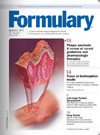Formulary e-News:
|
You are subscribed to %%list.name%% as %%emailaddr%%. Unsubscribe. |

|
|
|
|
Survey
With healthcare reform creating an FDA approval pathway for 'biosimilar' agents in the United States, what do you see as the primary implications of this from a managed care perspective in the next 3 years?
1) No impact, as I don't see any changes occurring soon
2) Limited savings with only a small number of products and small number of manufacturers
3) Moderate savings with the introduction of a several products at moderate discounting to innovator brands
4) Significant savings with several biosimilar options, significant discounts and enhanced rebating from innovator brands
|
|
|
|
|
|
Severe liver injury associated with dronedarone use
Severe liver injury, including 2 cases of acute liver failure leading to liver transplant in patients treated with the medication, has been associated with the use of dronedarone (Multaq), according to an FDA Drug Safety Communication announcement. Read full article. |
|
|
FDA approves ready-to-use 750-mg dosage of vancomycin
FDA has approved the premix formulation of vancomycin injection, USP (750 mg/150 mL) (Baxter). Vancomycin is an antibiotic used to treat severe infections caused by susceptible strains of methicillin-resistant Staphylococcus aureus and/or treat patients who are penicillin-resistant. Read full article.
|
|
Top 5 Web Stories
- First-time generic approvals December 2010
- Focus on 2010: A year of novel pharmacologic agents in review
- Dabigatran etexilate (Pradaxa): An oral direct thrombin inhibitor
- Study finds acetaminophen increases blood pressure in patients with coronary artery disease
- Focus on Azilsartan: A next-generation angiotensin II receptor blocker for the treatment of hypertension
|
|
Rifaximin could be treatment course for IBS
A 2-week course of rifaximin (Xifaxan, Salix Pharmaceuticals) relieved bloating and other symptoms of irritable bowel syndrome for more than 2 months after treatment ended, according to research published January 6 in the New England Journal of Medicine. Rifaximin is the first treatment that targets the underlying cause of IBS, rather than just treating the symptoms, researchers said. Read full article.
|
|
Potential confusion in morphine sulfate oral solutions dosage prompts label alteration
FDA and Roxane Laboratories are warning of serious adverse events and deaths as a result of a mistake in dosage of morphine sulfate oral solutions. Read full article.
|
|
NSAID use tied to higher risk of cardiovascular events
Commonly used nonsteroidal anti-inflammatory drugs may increase the risk of heart attack, stroke, and death, according to a meta-analysis published January 11 in British Medical Journal, HealthDay News reported. Read full article.
|
|
Patients see greater BP drop with combination therapy at the start
A combination drug therapy given initially appears to result in better blood pressure control in individuals compared with those who are treated with monotherapy, according to research published online January 13 in The Lancet, HealthDay News reported. Those who underwent the 2-drug treatment after taking the single-drug therapy also experienced better blood pressure outcomes, though not at the same level as those who began with the combination treatment. Read full article.
|
|
Risk of nontraumatic fractures may rise with use of antiepileptic drugs
Antiepileptic drugs (AEDs) may increase the risk of nontraumatic fractures in patients aged 50 years and older, according to a study published in the January issue of the Archives of Neurology, HealthDay News reported. Read full article.
|
|
Medication adherence by elderly after MI is low
Elderly patients have difficulty with long-term adherence to medications following myocardial infarction, and this is significantly worse among those with kidney dysfunction, according to a study published online January 13 in the Clinical Journal of the American Society of Nephrology, HealthDay News reported. Read full article.
|
|
|
|
Contact Us |
Contact a Formulary editor Click Here
Contact a Formulary sales representative Click Here
Learn about direct mail, reprints and classifieds in Formulary Click Here |
You are subscribed to %%list.name%% as %%emailaddr%%. Click here to unsubscribe or edit your member profile.
To ensure delivery to your inbox, please add us to your address book. If you need help doing this, Click here.
Advanstar Communications provides certain customer contact data (such as customers' names, addresses, phone numbers and e-mail addresses) to third parties who wish to promote relevant products, services and other opportunities which may be of interest to you. If you do not want Advanstar Communications to make your contact information available to third parties for marketing purposes, simply call (toll free) 866-529-2922 at any time, or
fax us at 218-740-6417. Outside the U.S., please phone 218-740-6395. Contact us by mail at Advanstar Communications Inc., 131 West First St., Duluth, MN 55802-2065, USA.
|
|

